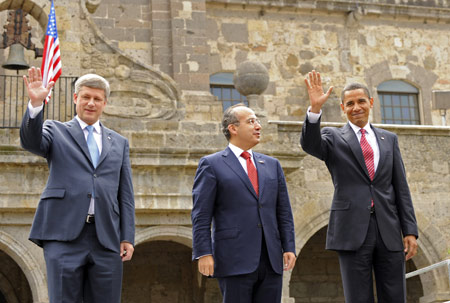By Omar Mendoza, Alejandra del Palacio
U.S. President Barack Obama has yet to fulfill his promises to Latin America four months after he met Latin American leaders at the 5th Summit of the Americas in April in Trinidad and Tobago, critics say.
 |
|
Canada's Prime Minister Harper, Mexico's President Calderon and U.S. President Obama (L-R) pose for pictures after the North American Leaders' Summit in Guadalajara, Mexico, August 10, 2009. The summit concluded here on Monday. [Xinhua] |
On the sidelines of the summit, Obama also met presidents of the 12 member countries of the Union of South American Nations (Unasur) and announced a new policy toward Latin America, based on dialogue and cooperation.
During the meeting, all leaders agreed to take advantage of the current historical opportunity to improve the U.S.-Latin America ties. Obama voiced his willingness to listen to and learn from Unasur.
The meeting, more or less, helped to improve the ties between the United States and Venezuela, but Latin American countries are still suspicious of the United States, which they said has all along carried out an aggressive policy in the continent and intervened in their domestic matters.
After that meeting, the United States and Venezuela lifted their ties to the ambassadorial level, but the U.S. Department of State soon accused Venezuela of facilitating international drug trafficking and impeding anti-drug efforts, which was flatly rejected by Venezuelan President Hugo Chavez.
Three months after the summit, Venezuela and Ecuador denounced the U.S. intention to sign an agreement with Colombia to use Colombian territory for military use after Ecuador declined to renew a treaty with the United States to use the Manta base in Ecuador.
Colombia and the United States said the agreement was aimed at fighting drug trafficking and terrorism in the region.
The agreement would allow the presence of 800 U.S. soldiers and 600 contractors from the Pentagon or U.S. security organizations for 10 years.
However, Venezuela and Ecuador have said the agreement endangers their security, and most South American governments have voiced their concern about the agreement, saying it is a means to increase U.S. military presence in the region and an excuse to monitor the region.
This is an issue to be discussed at the Unasur Summit on Monday.
Obama has also voiced his support for the war launched by Mexican President Felipe Calderon against drug trafficking in Mexico, but he has all along been blamed for not having done enough to fight the drug business in his own country, which is the biggest consumer of cocaine and marijuana in the world.
Another unfulfilled promise by Obama is the lifting of the embargo against Cuba.
At the summit in April, Latin American leaders unanimously appealed for ending the embargo, and Obama said "the U.S. will seek a new beginning to Cuba" depending on the steps taken by both governments.
After that, the U.S. government did take some measures, including allowing more remittance to Cuba, to loosen its embargo against Cuba, but the embargo, as a whole, continues.
In the case of Bolivia, after 10 months of a bilateral crisis, Bolivian President Evo Morales expressed disappointment when the Obama administration decided to suspend the Andean Trade
Promotion and Drug Eradication Act, which gave preferential duties for Bolivian exports to the United States.
It is understandable that the White House takes as its priorities the ongoing financial crisis, health system reform, Afghanistan, the Palestinian-Israeli conflict, but this is not the excuse for not starting the "new beginning" announced by Obama in April, critics say.
(Xinhua News Agency August 11, 2009)